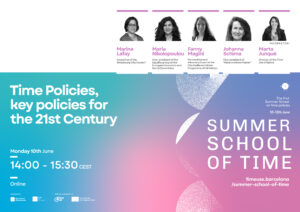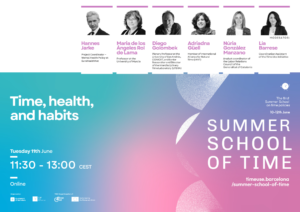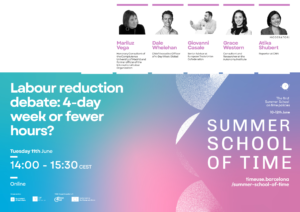Summer School of Time
The first Summer School on time policies
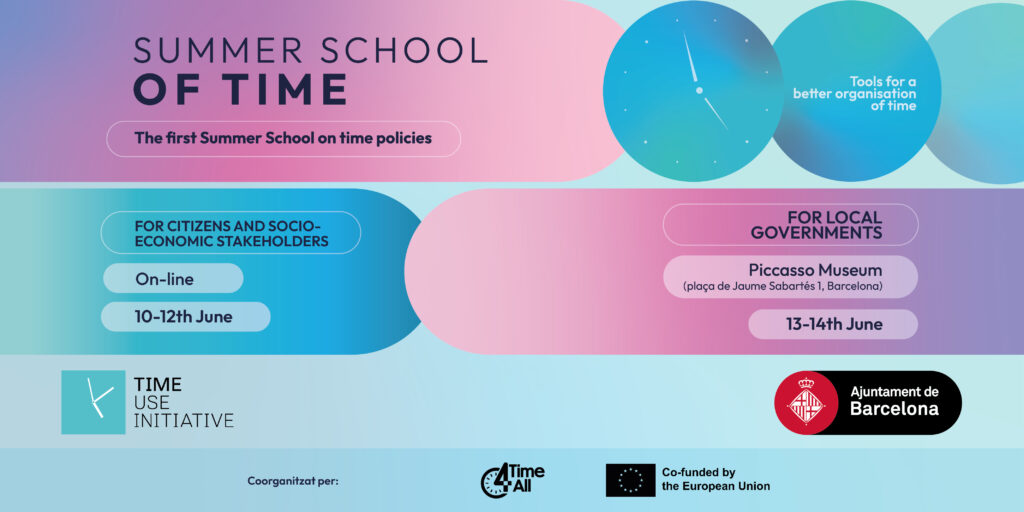
Dates: 10-14th June
Format: on-line (10-12th) and on-site in Barcelona (13-14th)
Languages: the on-line Summer School (10-12th June) will be fully in English, and the on-site Summer School (13-14th June) will be, in Catalan and English.
The Summer School of Time is the first European training programme on time policies, an instrument that institutions can use to tackle time unrest (including time poverty) and transform the 21st-Century society in order to make it more egalitarian, more efficient, more sustainable, and healthier.
The School is aimed at public officials, practitioners, researchers, and interested citizens and organisations. It seeks to provide both theoretical and practical knowledge on time policies and the right to time, a concept that embraces the individual and collective right to self-determine how to use our time. The School will focus on motivating and empowering participants to make positive changes in their communities. Through case-based sessions, attendees will gain practical tools to address specific needs using time policies. Additionally, recognizing that effective time policies also rely on building relations among its practitioners, networking opportunities will be provided to foster mutual support among participants.
The School will offer two different formats to facilitate participants’ engagement: the on-line Summer School of Time, aimed at general citizens and interested organisations, and the on-site Summer School of Time, aimed at public officials and elected representatives from local, metropolitan, or regional institutions.
Participants will receive a certificate upon participation in all the on-line sessions.
The on-line Citizen’s Summer School of Time sessions featured theoretical seminars and practical training exploring time unrest and providing tools to implement time policies within organisations. These sessions are designed for anyone interested in exploring how better social organisation of time can be addressed from different areas of expertise, with a special focus on organisations searching for bettering their time and working conditions.
Due to the international approach of this School, the language of all on-line events was English.
Time Policies, key policies for the 21st Century
Monday 10th June, 14:00-15:30 CEST
What are Time Policies and what’s their impact on the different areas of interaction. Round table with local and international organisations and experts on the topics of Time & Care; Time & Sustainability; Time & Social-Economic Impact.
With the participation of:
- Marina Lafay, Councillor of the Strasbourg City Council
- Maria Nikolopoulou, Vice-president of the Equality group at the European Economic and Social Committee
- Fanny Magini, Partnerships and Advocacy Expert at the City Resilience Global Programme of UN Habitat
- Johanna Schima, Vice-president of “Make mothers Matter”
Facilitation: Marta Junqué, Director of the Time Use Initiative
Time, health, and habits
Tuesday 11th June, 11.30-13.00 CEST
Introduction to the concepts of chronobiology. Why is it important to respect our circadian rhythms? A discussion with health and labour experts focused on the importance of maintaining a balanced time routine that promotes healthy habits, adequate rest and conscious screen time, addressing it through perspectives on public policy, end of seasonal clock change and digital disconnection.
With the participation of:
- Hannes Jarke, Project Coordinator – Mental Health Policy at EuroHealthNet.
- Maria de los Ángeles Rol de Lama, Professor at the University of Murcia.
- Diego Golombek, Plenary Professor at the University of San Andrés, CONICET, and Senior Researcher and Director of the Interdisciplinary Time Laboratory (LITERA).
- Ariadna Güell, Member of International Alliance for Natural Time (IANT).
- Núria Gonzàlez Manzano, analyst coordinator of the Labor Relations Council of the Generalitat of Catalonia
Facilitation: Lía Barrese, Coordination Assistant of the Time Use Initiative
Labour reduction debate: 4-day week or fewer hours?
Tuesday 11th June, 14.00-15.30 CEST
We are at the threshold of the new labour reform of our times, but what form should it take? Discussion among experts on the benefits and problems of 4 working days vs. reducing the working day. How is the situation across different countries in Europe?
With the participation of:
- Mariluz Vega, Honorary Consultant of the Complutense University of Madrid and former official of the International Labour Organization
- Dale Whelehan, Chief Executive Officer of 4-Day Week Global
- Giovanni Casale, Senior Advisor at European Trade Union Confederation
- Grace Western, Consultant and Researcher at the Autonomy Institute
Facilitation: Atika Shubert, reporter at CNN
Tools for implementing time policies in your organisation
Wednesday 12th June, 14.30-16.00 CEST
How could I implement time policies in my organisation? This session will answer this question and provide a set of tools for helping private organisations move towards healthier and more efficient ways of organising their time. Practical session with the presentation of 2/3 case studies.
With the participation of:
- Marta Junqué, Director of the Time Use Initiative
- Lía Barrese, Coordination Assistant of the Time Use Initiative
- Marc Martorell, Consultat of the Time Use Initiative
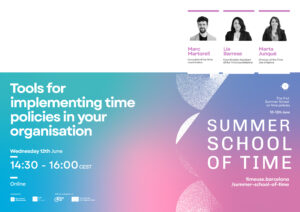
The on-site Summer School of Time focussed on implementing time policies from the local, metropolitan, and regional levels. Hosted by the Barcelona City Council on 13-14th June at Picasso Museum (plaça de Jaume Sabartés 1, Barcelona), these sessions were especially interesting for practitioners and public officials. They delved into practical insights on how to implement time policies effectively to foster a more equal, healthier, sustainable, and efficient urban society.
The language of all on-site events were both English and Catalan.
Thursday 13th June
- 9:30 h — Opening: Maria Rengel, Director of Feminism and LGTBI of the Barcelona City Council.
- 9:45 h — Opening conference: “2003–2024, 21 years of time policies in Barcelona City Council”, Inma Moraleda, Inma Moraleda, Former Member of Barcelona City Council.(1995-2015). Currently director of the Mayor’s Office of Santa Coloma de Gramenet.
- 10:15 h — Round table: “Quality employment and the right to time”.
- Lorena Ventura Calvo, Barcelona Activa, Barcelona Agreement for Quality Employment
Laura de Caralt, Barcelona City Council, NUST Network – Network of companies for a new working time. - Ana Pérez Clemente, People Manager, PM & BPM Consultant – Iterem (NUST network company).
- Moderator: Alicia Egea, Barcelona Activa.
- Lorena Ventura Calvo, Barcelona Activa, Barcelona Agreement for Quality Employment
- 11.00 h — Coffee Break
- 11:30 h — Presentation: “Tools to self-evaluate time policies”.
- Lía Barrese, Time Use Initiative.
- Pedro Martín Cumplido, Barcelona Metropolitan Area.
- 12:00 h — Participative workshop: “What is meant by a city of proximity?”, Diego Sánchez and Seunghoon Han. Chair of Entrepreneurship Territory Innovation – Sorbonne Business School.
- 14:00 h — Lunch and networking.
Friday 14th June
- 9:30 h — Conference: Caren Grown, Senior Fellow, Center For Sustainable Development, the Brookings Institution.
- 10:00 h — Roundtable: “Time policies in the world. Global experiences”.
- Ingrid Gómez Saracíbar, Secretary for Women from Mexico City.
- Carolina Barone, Undersecretary for Women from Buenos Aires.
- Facilitator: Marta Junqué, director of the Time Use Initiative.
- 10:45 h — Roundtable: Challenges and achievements of Quantifying time: urban planning, mobility and time poverty.
- Ana Paricio, Barcelona Regional
- Gemma Solé, Institute Metropoli
- Georgina Monge, Barcelona City Council
- Facilitator: Mar Camarasa, Barcelona City Council.
- 11:30 h — Coffee break
- 12:00 h — Conference: “Circadian rhythms, public time policies and the city”.
- Diego Golombek – CONICET.
- Carla Estivill, Director of the Estivill Clinic and head of research.
- Facilitator: Georgina Monge, Barcelona City Council
- 12:45 h — Closing remarks: Raquel Gil Eiroá, Councillor for Economic Promotion, Work, Feminism and Democratic Memory.
- 13:15 h — Visit to the Parc de la Ciutadella Greenhouse. Guided tour of the exhibition on sustainability.
Conclusions are available here.
Why is it urgent to discuss time?
Time is a growingly scarce and unequal resource. 20% of European citizens, rising to 34% among women with children, are experiencing time poverty: they do not have a literal minute for themselves after completing their necessary activities of work, sleep, and care. All of us are feeling this disturbing sensation of being under constant time pressure.
The consequences of time poverty and time inequality are far-reaching, affecting both individual well-being and social cohesion. Countless studies highlight the adverse impact of time poverty on mental and physical health, ranging from heightened risks of depression and obesity to anxiety and cardiovascular diseases. It corrodes the very fabric of our society, diminishing democratic participation and limiting social interactions with loved ones. It also hampers economic growth, as workers trapped in time-poor environments struggle to strike a healthy work-life balance, ultimately diminishing productivity. As a case in point, it is calculated that structural sleep deprivation leads to estimated losses in national GDP of 1% to 2%.
Objectives of the on-line Citizen’s Summer School
- Provide participants with a comprehensive understanding of time policies, right to time and time poverty and how they affect our daily lives.
- Offer engaging theoretical seminars on key topics such as health, digital disconnection and work, equipping the audience with tools and knowledge.
- Empower participants to take action and make positive contributions to their communities based on the knowledge and skills acquired during the online Summer School sessions.
- Equip organisations with practical tools to improve time organisation and working staff conditions.
Objectives of the on-site Public Officials' Summer School
- Knowledge Sharing: Facilitate in-depth discussions and exchanges of knowledge among experts, policymakers, and elected representatives on the importance of time policies in promoting societal well-being.
- Capacity Building: Equip participants with practical tools and methodologies to implement effective time policies tailored to their organization’s needs.
- Network Expansion: Create a platform for participants to establish meaningful connections, share experiences, and access ongoing support for their time policy initiatives beyond the summer school.
Co-organised by: Barcelona City Council, Time Use Initiative
With the participation of: Local and Regional Governments Time Network
Co-funded by Time4All and the European Union




